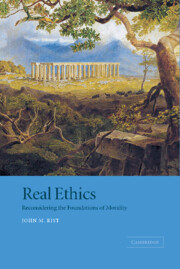Book contents
- Frontmatter
- Contents
- Acknowledgements
- Introduction: Ethical crises old and new
- 1 Moral nihilism: Socrates vs. Thrasymachus
- 2 Morals and metaphysics
- 3 The soul and the self
- 4 Division and its remedies
- 5 Rules and applications
- 6 The past, present and future of practical reasoning
- 7 Autonomy and choice
- 8 Ethics and ideology
- 9 God and ethics
- Bibliography
- Index
Introduction: Ethical crises old and new
Published online by Cambridge University Press: 16 January 2010
- Frontmatter
- Contents
- Acknowledgements
- Introduction: Ethical crises old and new
- 1 Moral nihilism: Socrates vs. Thrasymachus
- 2 Morals and metaphysics
- 3 The soul and the self
- 4 Division and its remedies
- 5 Rules and applications
- 6 The past, present and future of practical reasoning
- 7 Autonomy and choice
- 8 Ethics and ideology
- 9 God and ethics
- Bibliography
- Index
Summary
The present book is in part, and necessarily, a reflection on topics in the history of ethics from the time of Socrates and even earlier, but its core concern is what is widely admitted to be a crisis in contemporary Western debate about ethical foundations. Discussion of this crisis – including the status of older claims that coherent moral propositions must be grounded in metaphysical truths, and the consequences for all of us if they cannot – is at present carried on largely within academic departments of philosophy, where it is widely believed that not only transcendental realism – the belief in an absolute good – but even much weaker forms of moral objectivism have already been emasculated if not killed off outright. We – whoever ‘we’ may be, and here too anti-realism soon raises its head – must now resort for ‘meaningfulness’ and ‘fulfilment’ to some sort of critical choice among what we see as goods and ourselves rationally ‘construct’ the values on which moral theorizing will rest. The effects of this crisis in ethical theory are already visible in the world outside the universities as well as inside: in reassessments of our responsibility for the poor in Western states (not to speak of those in the Third World), in arguments over the ‘ethics’ of the market economy or of modern warfare or arms trading, in debates about what, if any, public policies should be adopted to control research in genetics and about the increasing number of ‘quality of life’ issues which arise in the practice of medicine.
- Type
- Chapter
- Information
- Real EthicsReconsidering the Foundations of Morality, pp. 1 - 9Publisher: Cambridge University PressPrint publication year: 2001



